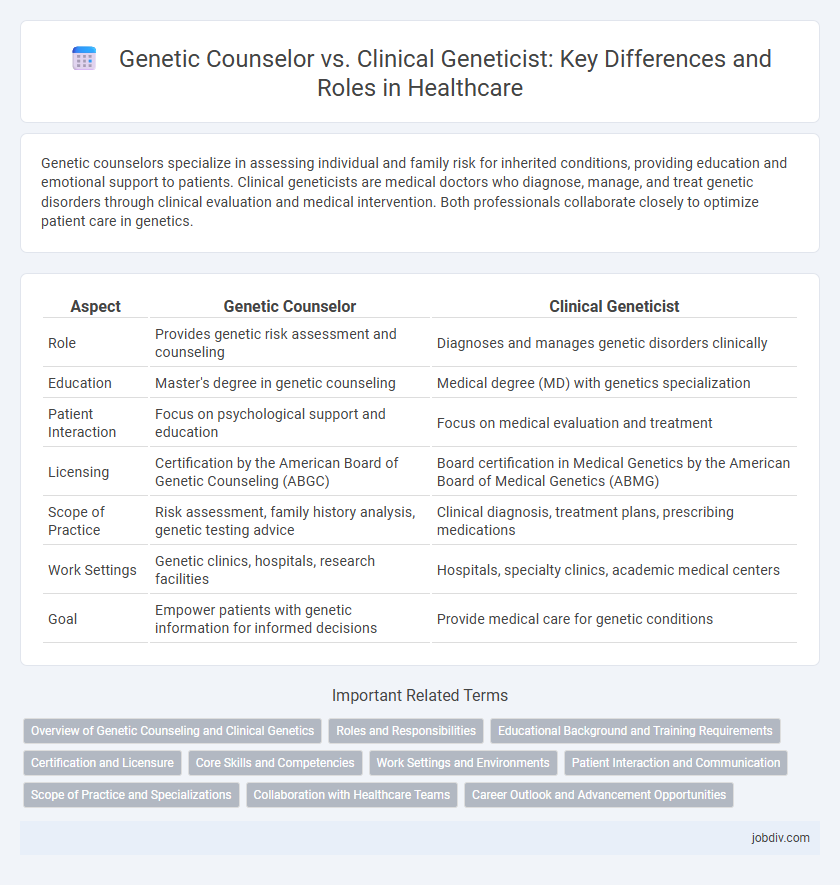Genetic counselors specialize in assessing individual and family risk for inherited conditions, providing education and emotional support to patients. Clinical geneticists are medical doctors who diagnose, manage, and treat genetic disorders through clinical evaluation and medical intervention. Both professionals collaborate closely to optimize patient care in genetics.
Table of Comparison
| Aspect | Genetic Counselor | Clinical Geneticist |
|---|---|---|
| Role | Provides genetic risk assessment and counseling | Diagnoses and manages genetic disorders clinically |
| Education | Master's degree in genetic counseling | Medical degree (MD) with genetics specialization |
| Patient Interaction | Focus on psychological support and education | Focus on medical evaluation and treatment |
| Licensing | Certification by the American Board of Genetic Counseling (ABGC) | Board certification in Medical Genetics by the American Board of Medical Genetics (ABMG) |
| Scope of Practice | Risk assessment, family history analysis, genetic testing advice | Clinical diagnosis, treatment plans, prescribing medications |
| Work Settings | Genetic clinics, hospitals, research facilities | Hospitals, specialty clinics, academic medical centers |
| Goal | Empower patients with genetic information for informed decisions | Provide medical care for genetic conditions |
Overview of Genetic Counseling and Clinical Genetics
Genetic counselors specialize in assessing individual and family risk for genetic conditions, providing education, support, and guiding decision-making based on genetic test results. Clinical geneticists are medical doctors trained to diagnose, treat, and manage patients with hereditary disorders, integrating clinical evaluations with genetic information. Both professionals collaborate to deliver comprehensive care in genetic medicine, combining counseling expertise and clinical diagnostic skills.
Roles and Responsibilities
Genetic counselors specialize in assessing family histories, educating patients about inherited conditions, and guiding decision-making regarding genetic testing and health management. Clinical geneticists focus on diagnosing genetic disorders, developing treatment plans, and conducting clinical evaluations to manage complex hereditary diseases. Both professionals collaborate to provide comprehensive genetic care, combining counseling expertise with medical diagnosis and intervention.
Educational Background and Training Requirements
Genetic counselors typically hold a master's degree in genetic counseling, completed within a specialized graduate program accredited by the Accreditation Council for Genetic Counseling (ACGC), including extensive clinical rotations. Clinical geneticists are medical doctors who complete medical school followed by a residency in medical genetics or pediatrics and often pursue board certification through the American Board of Medical Genetics and Genomics (ABMGG). Both professions require a deep understanding of genetics, but clinical geneticists possess broader medical training to diagnose and manage genetic disorders, while genetic counselors focus on risk assessment, patient education, and psychosocial support.
Certification and Licensure
Genetic counselors typically obtain certification through the American Board of Genetic Counseling (ABGC), which requires a master's degree in genetic counseling and passing a national exam. Clinical geneticists must be licensed physicians, often certified by the American Board of Medical Genetics and Genomics (ABMGG), necessitating completion of a medical degree, residency, and board examination. Licensure for clinical geneticists varies by state, while genetic counselor credentialing is recognized nationally to ensure standardized professional practice.
Core Skills and Competencies
Genetic counselors excel in patient communication, risk assessment, and psychosocial support, enabling informed decision-making about hereditary conditions. Clinical geneticists possess advanced medical expertise in diagnosing genetic disorders, interpreting complex genetic tests, and managing treatment plans. Both professionals require strong knowledge of human genetics, but genetic counselors emphasize counseling and education, while clinical geneticists focus on clinical evaluation and medical intervention.
Work Settings and Environments
Genetic counselors primarily work in outpatient clinics, hospitals, and specialized genetic testing laboratories, providing patient education and risk assessment in a collaborative healthcare setting. Clinical geneticists typically operate within hospital environments and specialized medical centers, diagnosing and managing complex genetic disorders through direct patient care and multidisciplinary team coordination. Both professionals frequently engage with research institutions to stay at the forefront of genetic advancements and innovations.
Patient Interaction and Communication
Genetic counselors specialize in patient interaction by providing detailed explanations about inheritance patterns, risks, and testing options, ensuring patients understand their genetic information in a compassionate and accessible manner. Clinical geneticists, as medical doctors, focus on diagnosing genetic disorders through physical examinations and interpreting complex genetic test results, often discussing medical management and treatment plans with patients. Both professionals collaborate to deliver comprehensive care, but genetic counselors prioritize communication and emotional support, while clinical geneticists emphasize clinical diagnosis and medical intervention.
Scope of Practice and Specializations
Genetic counselors specialize in assessing inherited conditions, providing risk analysis, and offering psychosocial support to patients and families, focusing on education and decision-making assistance. Clinical geneticists are medical doctors who diagnose and manage genetic disorders, perform detailed clinical evaluations, and oversee patient treatment plans, often collaborating with multidisciplinary teams. Their scope of practice differs in that genetic counselors emphasize counseling and testing coordination, while clinical geneticists have the authority to prescribe treatments and conduct medical interventions.
Collaboration with Healthcare Teams
Genetic counselors and clinical geneticists collaborate closely within healthcare teams to provide comprehensive genetic services, combining counseling expertise with medical diagnostics. Genetic counselors assess patient histories and communicate complex genetic information, while clinical geneticists diagnose genetic disorders and develop treatment plans. Their teamwork enhances patient care by integrating psychosocial support with precise clinical management in personalized medicine.
Career Outlook and Advancement Opportunities
Genetic counselors and clinical geneticists both play crucial roles in genetic healthcare, but differ significantly in career outlook and advancement opportunities. Genetic counselors often enjoy a growing demand driven by increased awareness of genetic testing, with strong employment growth projected in healthcare and research settings. Clinical geneticists, typically medical doctors with specialized training, have opportunities for advancement in clinical practice, research leadership, and academic roles, though require longer educational pathways and medical licensure.
Genetic Counselor vs Clinical Geneticist Infographic

 jobdiv.com
jobdiv.com